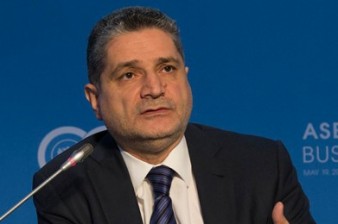


ArmInfo. The condition of EEU countries economies, main aspects of EEC activities and the options of business entities participation in it were discussed at the meeting of Business Russia General and Regional Board members with EEC Board Chairman Tigran Sargsyan on May 25.
As Tigran Sargsyan mentioned, in early 2017 in EEU the economic growth has been fixed in respect for all the five countries first for all the time. The foreign trade turnover of all five countries for January-March 2017 grew for 29% versus that of the similar period of last year. The mutual trade growth formed 31, 1%. "The number of companies funded by EEU partner countries also grows," the EEC Board Chairman stated. " The real sector of economy develops, cargo and passenger flows also grow. The forecast of the Commission by the year of 2019 is sustainable positive. "
Tigran Sargsyan informed the entrepreneurs about the formats of cooperation of the Commission with business-society. A Business Council is working under the EEU, comprising business associations from all the member countries. Its main task is to develop a consolidated position due to EEU decisions and to propose initiatives. Another format of cooperation of EEU and business is the consulting commissions and working teams where the draft projects are being developed.
The Commission provides public discussions of draft decisions, which could be participated by any representative of business community of Union. In 2016, the 80% of notes and remarks received were considered.
The Board of the Commission operates as a cabinet government, with 14 members of the Commission ("commissioners"). There are three members per member state (and until 1 January 2016: 2 from Kyrgyzstan). The Chairman of the commission (currently Tigran Sargsyan) is nominated by the heads of state of the member states of the EEU. The Commission includes an administrative body composed of 23 departments, 18 consultative committees, and 2000 civil servants. The usual working language of the Commission is Russian.
The EEC was constituted by the Treaty on the Eurasian Economic Commission, signed on November 18, 2011 and which entered into force on 1 January 2012. It began it operations on February 2, 2012. On 1 January 2015 it became the principle organ of the Eurasian Economic Union, upon entry into force of the Treaty on the European Economic Union.